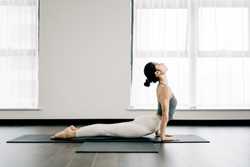- Sizes: 7-16 (half sizes through 12.5)
- Weight: 13.57 ounces
- Waterproof: Yes
- Price on publish: $150
Best Men's Hiking Boots for Hitting the Trail in Style
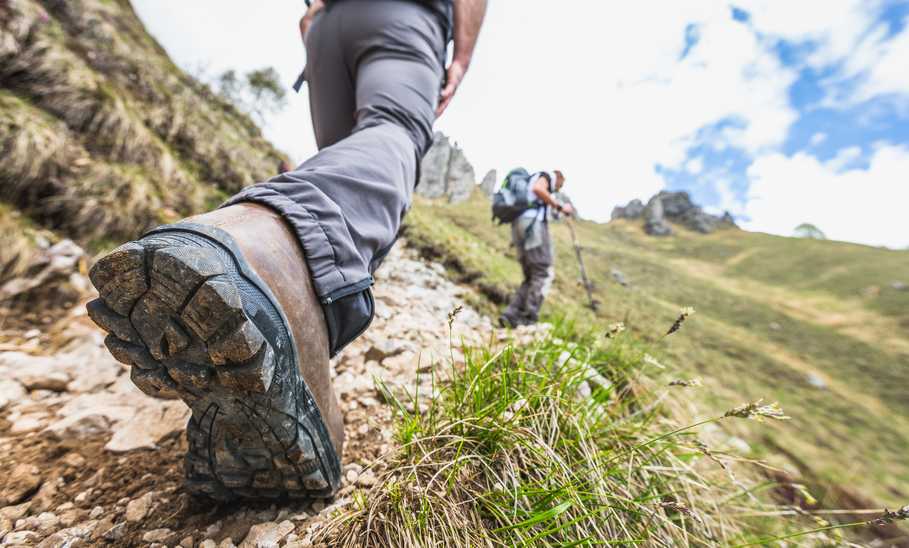
Our evaluations and opinions are not influenced by our advertising relationships, but we may earn a commission from our partners’ links. This content is created by TIME Stamped, under TIME’s direction and produced in accordance with TIME’s editorial guidelines and overseen by TIME’s editorial staff. Learn more about it.
When you’ve got some serious trails to traverse, you need to get serious about your shoes. As much as you might love your trail running shoes, what you really need is a reliable pair of hiking boots, specifically designed for keeping your feet safe, dry, and comfortable when tromping mile after mile. Below, you’ll find our picks for the best hiking boots for men. Now take a hike!
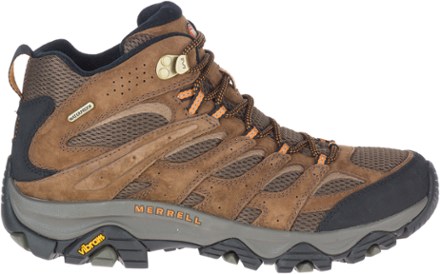
While “affordable” is a somewhat subjective term, those wanting a reasonably-priced boot that still does everything you’d want it to would do well to check out this offering from Merrell. “The Moab 3 is a great option for the more casual hiker who’s looking for a quality boot that doesn’t break the bank,” says Charles Fratto, style director for ILOE Studios. Featuring air cushioning for extra shock absorption and protective rubber heels and toe caps, you’re definitely getting your money’s worth. Shopping tip: Merrell’s commitment to quality outdoor footwear is why the brand also made our lists for the best walking shoes for men and best shoes for plantar fasciitis.
A rugged, reliable pair of hiking boots without an overly inflated price tag.
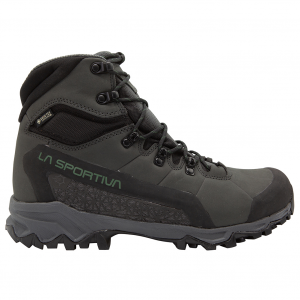
Anyone who’s ever accidentally soaked their socks on a hike knows the value of a waterproof hiking boot. Fratto recommends this pair from La Sportiva, saying that, “with Gore-Tex Surround lining technology, this boot keeps you dry on those trails that lead you through any body of water you might cross.” They also have outstanding grip and flexible ankle supports.
A sci-fi-looking boot with all the features you’d need for keeping your feet safe and dry on a hike.

No one wants to feel like they’re dragging weights on their feet when hiking, so consider a lightweight boot if that’s a concern for you. “This boot was designed for the hiker on the go who doesn’t want anything weighing them down,” says Fratto. Waterproof, stable, and lightweight, they’ll take whatever you throw at them on the trail.
A lightweight, waterproof, and reliable pair of boots for people who like to keep moving.

If you’re tackling not just the trail, but the elements, you’ll need some extra grip to stay upright. Legezynski recommends these super grippy shoes from Icebug, saying that, “these shoes are known to offer great traction on ice and snow, without an overbearing form factor. They’re built with good ethical and sustainability practices, too.” While you’re shopping for winter gear, be sure to also check our guide to the best winter jackets and coats for men to complete your cold weather wardrobe.
An insanely grippy, compact shoe, perfect for demanding winter hikes.
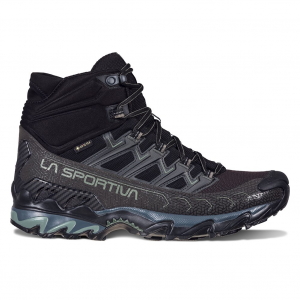
One glance at these boots from La Sportiva, and you can tell they mean business. If your hiking tastes run to the more extreme, Fratto suggests giving them a try. “Designed to bring the best of a hiking shoe and a hiking boot together, these will give you the advantage as you make your way over and under those more demanding trails.”
A high-performance, technical hiking boot for really showing the trail who’s boss.

As sturdy and reliable as many hiking boots are, they don’t always give you the cushioning your feet might require. For a little extra comfort on those long walks in the woods, Fratto advises trying this pair from Adidas, saying that, “with Responsive Boost cushioning, these boots give you max comfort from an iconic brand.”
A comfortable, lightweight pair of boots in a wide range of colors.

When you’re dealing with all kinds of inclines and rough terrain, you have to be certain that your feet are supported and protected, which these boots accomplish with their rugged exterior and high-tech mix of shock-absorbing foams. “Mountain adventures require stability and support, both of which are sure to be met with this choice,” says Fratto.
A high-end, mountain-friendly hiking boot, with a price tag to match.

If you’re taking a fairly casual hike and care more about the aesthetics than the features, Moncler has you covered—for a price. “Designer and hiking boots don’t seem like they could go hand in hand, but if you’re looking to splurge on a pair then these boots can take you from the trail to a night out on the town, all in one go,” says Fratto. It’s not every pair of hiking boots that’ll work with dress pants!
A stunning, if not entirely practical pair of hiking boots, ideal for casual hikes to the nearest bar.

For a more practical pair of leather hiking boots, check out The North Face’s Cragstone Leather Mid Waterproof boots. Featuring molded nubuck leather with a waterproof DryVent membrane, a lightweight, high-rebound EVA midsole, and grippy rubber outsoles, they’re a great lightweight option that’ll do the job of looking after your feet. The North Face has also been a fixture on many of our lists of the best outdoor clothing and footwear, including the best winter boots for men, the best fleece jackets for men, and even the best flip-flops for men.
A reliable, resilient leather hiking boot that’s comfortable enough to wear most days.
Our selections were made through careful consideration of our experts’ advice, personal experience, and scouring customer feedback to ensure that all of our picks had mostly positive reviews. For the latter, we took special account of longevity, comfort, and value for money.
“There are a huge number of variables between hiking boots,” warns Alex Legezynski, founder of West London Personal Training. He suggests paying careful attention to the following:
“The importance of a great fit can not be understated,” says Legezynski. “Your foot shape—and any pre-existing imbalances or vulnerabilities—must be accounted for in your shoe selection.”
“Upper materials impact the boot's durability, breathability, and water resistance,” explains Legezynski. “Full-grain leather is durable but may be less breathable, while synthetics like nylon are lighter and more breathable. Some boots combine materials for a balance of features.”
“Midsoles provide cushioning, and EVA (ethylene-vinyl acetate) is a common material for these due to being lightweight, as well as its shock absorption properties,” he continues. “Some boots feature PU (polyurethane) for more durability and stability, but it can add weight.”
“Look for outsoles with a lug pattern suitable for the terrain you'll encounter,” he concludes. “Vibram soles are renowned for their durability and traction. Consider the hardness of the rubber—harder compounds last longer, but may offer less grip.”
“As a general rule, think, ‘always snug, never tight,’” suggests Legezynski. “A looser fit may feel comfortable in the short term, but the friction and injury potential are punishing. This might mean some discomfort at first, particularly in harder-wearing boots that need breaking in, but breaking in should be considered part of your hiking preparation.”
“Lighter boots are generally more comfortable for shorter hikes and day trips, while heavier boots with more robust support are suitable for longer treks and carrying heavier loads,” says Legezynski. “Strike a balance based on your intended use.”
Since a washing machine could easily damage a pair of hiking boots, you’re going to have to hand wash them. “Be sure to use a soap that’s safe to use, preferably a soap specifically made for cleaning boots,” advises Fratto. “Water, a cloth, and a dedicated toothbrush for the task are really all you need to clean your boots.”
“Just as important is how you dry them,” he adds. “Remove the insoles and dry them separately, making sure to air dry in a room temperature setting with no additional heat source (if you want to speed up the drying process, use a fan). Be sure your boots and insoles are completely dry before reinserting them and putting them away for storage.”
“It really all depends on the terrain that you'll be hiking on,” says Dr. William Spielfogel, board-certified podiatrist and medical advisor to The Good Feet Store. “If you're hiking on hard surfaces, additional cushioning in the shoe will be helpful. Walking on softer surfaces will provide natural cushioning and shock absorption and will require less cushioning in your hiking boot or shoe.”
“A heavier shoe will cause you to exert more energy when walking,” warns Spielfogel. “Most importantly, hiking boots should be comfortable and lightweight and made of materials to support and protect your feet over uneven terrain.”
“Wearing hiking boots every day can be acceptable in certain situations, but it depends on your specific needs, activities, and personal comfort,” says physician assistant and Merrell brand ambassador Leila Nabavi, PA-C. “If the hiking boots are comfortable for everyday wear and provide adequate support, there may be no issue with wearing them regularly.”
“If you have specific foot conditions or concerns, it's essential to choose footwear that supports your foot health,” she continues. “Some people may need specialized shoes or orthopedic footwear for daily use, so check with a podiatrist for individualized concerns you may have or need.”
For other daily shoe recommendations, try our guide to the best Chelsea boots for men.
“Generally speaking, hiking boots should never be uncomfortable,” says Fratto. “However, if you have a boot that’s heavier and offers more support, then you will need to break it in. Don’t let your time on the trail be the first time that you’ve worn them out and about–take the time to get used to them beforehand so you can enjoy your hike as much as possible and not worry about any potential discomfort.”
According to Legezynski, most hiking boots–whether bought from any of the above brands, Columbia, Muck Boot Company, The North Face, Dicks Sporting Goods, Backcountry, or anywhere else–fall into the following categories:
The information presented here is created by TIME Stamped and overseen by TIME editorial staff. To learn more, see our About Us page.

